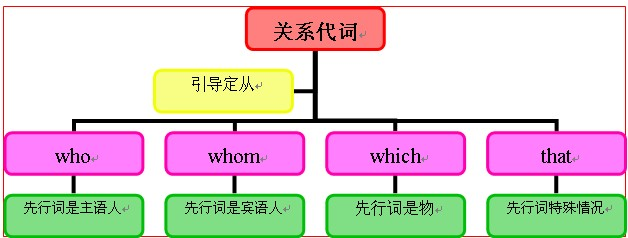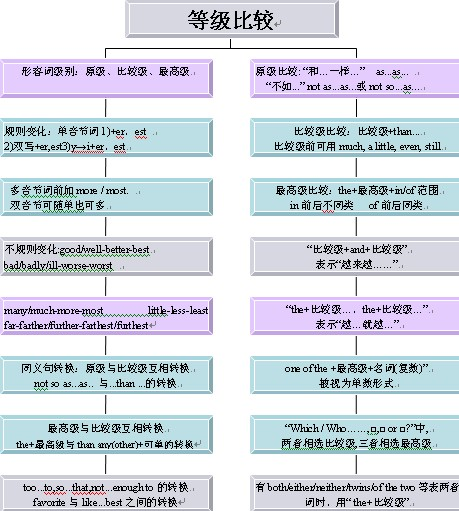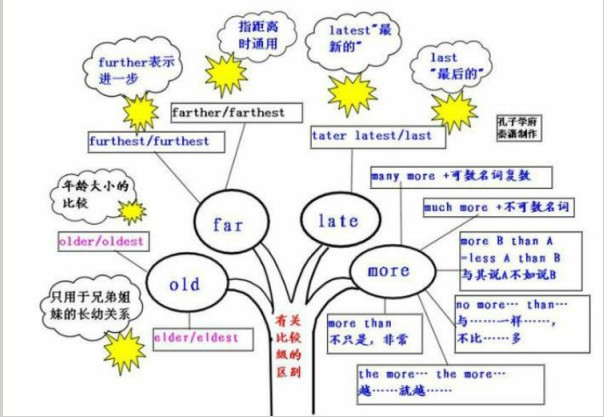本试题 “There are two buildings, _____ stands nearly a hundred feet high. [ ]A. the largerB. the larger of themC. the larger one thatD. the larger of which” 主要考查您对关系代词
形容词的比较级
非限制性定语从句
等考点的理解。关于这些考点您可以点击下面的选项卡查看详细档案。
- 关系代词
- 形容词的比较级
- 非限制性定语从句
关系代词的概念:
英语中的关系代词有who, whom, whose, that, which, 它们是用来引导定语从句的。关系代词既代表定语从句所修饰的词,又在其所引导的从句中承担一个成分,如主语、宾语、表语、或定语。
如:This is the man who saved your son. (who在从句中作主语,先行词是man)
The man whom I met yesterday is Jim.
A child whose parents are dead is an orphan.
He wants a room whose window looks out over the sea.
关系代词用法:
1、that与which的用法区别:
两者都可指物,常可互换。其区别主要在于:
(1)引导非限制性定语从句时,通常要用which:
如:She received an invitation from her boss, which came as a surprise. 她收到了老板的邀请,这是她意想不到的。
(2)直接放在介词后作宾语时,通常要用which:
如:The tool with which he is working is called a hammer. 他干活用的那个工具叫做锤子。
(3)当先行词是下列不定代词或被它们修饰时much, little, none, all, few, every(thing), any(thing), no(thing)等时,通常用that:
如:There was little that the enemy could do but surrender. 敌人无法,只有投降了。
All[Everything] that can be done must be done. 凡能做的事都必须做。
(4)当先行词有the very, the only, the same等修饰时,通常用that:
如:This is the only example that I know. 我知道的例子只有这一个。
Those are the very words that he used. 那是他的原话。
(5)当先行词有形容词最高级或序数词(包括last, next等)等修饰时,通常用that:
如:This is the best dictionary that I've ever used. 这是我用过的最好的词典。
The first thing that you should do is to work out a plan. 你应该做的第一件事是订个计划。
(6)当关系代词在定语从句中用作表语时,通常用that:
如:China is not the country(that) it was. 中国已不是过去的中国了。
(7)当先行词是一个既指人又指物的并列词组时,通常用that:
如:They talked about the persons and things that most impressed them. 他们谈论了使他们印象最深的人和事。
(8)当要避免重复时:
如:Which is the course that we are to take? 我们选哪门课程?
2、that与who的用法区别:
(1)两者均可指人,有时可互换:
如:All that[who] heard him were delighted. 所有听了他讲话的人都很高兴。
Have you met anybody that[who] has been to Paris? 你遇见过到过巴黎的人吗?
He is the only one among us that[who] knows Russian. 他是我们中间唯一懂俄语的人。
(2)但是在下列情况,通常要用that:
①当先行词是一个既指人又指物的并列词组时:
如:I made a speech on the men and things that I had seen abroad. 我就我在国外所见到的人和事作了报告。
②当先行词是who时(为避免重复):
如:Who was it that won the World Cup in1982? 谁赢得了1982年的世界杯?
③当关系代词在定语从句中作表语时(可省略):
如:Tom is not the boy(that) he was. 汤姆这孩子已不是以前那个样子了。
关系代词知识体系:

关系代词用法拓展:
1、as与which的用法区别:
(1)引导限制性定语从句时,在such,as,thesame后只能用as,其他情况用which:
如:I never heard such stories as he tells. 我从未听过他讲那样的故事。
It's the same story as I heard yesterday. 这故事跟我昨天听到的一样。
This is the photo which shows my house. 这张照片拍的是我的住宅。
(2)引导非限制性定语从句时,有时两者可互换:
如:I live a long way from work, as [which] you know. 我住得离工作单位很远,这你是知道的。
(3)但在,在以下情况引导非限制性定语从句时,两者不可换用:
①当从句位于主句前面时,只用as:
如:As is known to everybody, the moon travels round the earth once every month. 月球每月绕地球转一周,这是每个人都清楚的。
②as引导的非限制性定语从句应与主句在意义上和谐一致,which无此限制:
如:He went abroad, as[which] was expected. 他出国了,这是大家预料到的。
He went abroad, which was unexpected. 他出国了,这让大家感到很意外。(不用as)
③as引导非限制性定语从句时,先行词通常不能是主句中某个具体的词,而应是整个句子、整个短语或某个短语推断出来的概念,而which则无此限制:
如:The river, which flows through London, is called the Thames. 这条流经伦敦的河叫泰晤士河。(不用as)
④当as引导非限制性定语从句作主语时,其谓语通常应是连系动词,而不宜是其他动词,而which则无此限制:
如:She has married again, as[which] seemed natural. 她又结婚了,这似乎很自常。
She has married again, which delighted us.她又结婚了,这使我们很高兴。(不用as)
2、who与whom的用法区别:
两者均只用于人,从理论上说,who为主格,whom为宾格:
如:Where's the girl who sells the tickets? 卖票的女孩在哪里?
The author whom you criticized in your view has written a letter in reply. 你在评论中批评的那个作者已写了一封回信。
但实际上,除非在正式文体中,宾格关系代词whom往往省略不用,或用who或that代之:
如:The man(that, who, whom) you met just now is called Jim. 你刚遇见的那个人叫吉姆。
不过,在以下几种情况值得注意:
(1)直接跟在介词后面作宾语时,只能用whom,而且不能省略:
如:She brought with her three friends, none of whom I had ever met before. 她带了3个朋友来,我以前都没见过。
(2)引导非限制性定语从句且作宾语时,who和whom均可用,但以用whom为佳,此时也不能省略:
如:This is Jack, who[whom] you haven't met before. 这是杰克,你以前没见过。
形容词比较级概念:
大多数形容词(性质形容词)有比较级,用来表示两个人或事物之间的比较“较……”。
如:I am taller than you.
形容词比较级特殊用法:
1、没有比较对象的比较结构:
所谓没有比较对象的比较结构不是指省略而言,而是指并非真正的比较。
例如:The car runs faster than110 miles. 那辆车时速为110多英里。
There is more than one solution to the problem. 这个问题的解决办法不止一个。
The daily cost in an average hospital in the United States can run as high as $250. 在美国普通医院的每天的费用可高达250美元。
2、用比较级的形式表达最高级的意思:
在这种情况下,往往是将一个人或是一件事与其他所有的人或事相比较。注意别忘了常在比较状语中用any, other, else类的字眼,以将比较主体排除在比较对象以外,因为自己不可以与自己相比较。
例如:He is taller than any one else in our class. 他在我们班比其他任何都高。
Iron is more useful than any other metals. 铁比其他任何金属更有作用。
3、no+比较级+than的结构表示“A和B一样不……”:
例如:She runs no faster than her sister.她与她妹妹一样跑不快。
Tom is no wiser than John. 汤姆和约翰一样没有聪明才智。
He is no richer than his brother. 他与他弟弟一样不富有。
4、汉语可以说“昆明的气候比兰州好”。英语必须加that:
例如:The climate of Kunming is better than that of Lanzhou.
5、英语比较级常译作“较…”、“…一些”等,但不等于汉语的“更…”。汉语的“更…”须用“still”或“even”来表示:
如:This book is even more difficult than that one. 这本书比那本书更难。
6、有些情况下,汉语不用“较”等字眼,英语则须用比较级:
如:Will the younger people give their seats to old people? 请年轻人把座位让给老年人好不好?
形容词比较级的用法:
1、比较级用于二者的比较,其结构是:含有形容词比较级的主句+从属连词than引导的从句(从句中常省去意义上和主句相同的部分)。
如:Li is older than Zhou. 李比周年纪大。(从句中省去了is old)
There are more children in this nursey than in that one. 这个托儿所的孩子比那个托儿所多。(从句中省去了there are children)
After two years' physical training, she is healthier and stronger. 经过两年的体力锻炼,她(比以前)健康强壮多了。(注意这里省去了从句than she was)
We are much better off than ever before. 我们的生活比过去任何时候都要好得多。(than后省去了we were)
Paul weighs less than harry. 保尔的体重比哈利轻。
Mary is less clever than Jane. 玛丽不如简那么聪明。
2、可修饰比较级的词:
1)a bit, a little, rather, much, far, by far, many, a lot, lots, a great deal, any, still, even等
2)还可以用表示倍数的词或度量名词作修饰语。
3)以上词(除by far)外,必须置于比较级形容词或副词的前面。
典型例题:
1)—Are you feeling ____?
—Yes,I'm fine now.
A. any well
B. any better
C. quite good
D. quite better
答案:B. any可修饰比较级,quite修饰原级,well的比较级为better.
2)The experiment was____easier than we had expected.
A. more
B. muchmore
C. much
D. moremuch
答案:C. much可修饰比较级,因此B,C都说得通,但easier本身已是比较级,不需more,因此C为正确答案。
3)If there were no examinations, we should have___at school.
A. the happiest time
B. a more happier time
C. much happiest time
D. a much happier time
答案:D.
注:many, old和far用法:
1)如果后接名词时,much more+不可数名词 many more+可数名词复数
2)old有两种比较级和最高级形式:older/oldest和elder/eldest。elder,eldest只用于兄弟姐妹的长幼关系。
如:My elder brother is an engineer.
3)far有两种比较级,farther,further在英语中两者都可指距离。在美语中,father表示距离,further表示进一步。
如:I have nothing further to say.
3、比较级中的两个特殊作用的结构:
1)The+比较级+句子,表示的意义是“越(怎么样就)越(怎么样)”,在这个结构中的两个“比较级”不要求一定词性相同,它们各自的词性要依句子的需要而定;
2)和比较级+and+比较级。表示的意义是“越来越(怎么样)”,在这个结构中的两个“比较级”则要求词性相同。
例如:The harder you work at your study, the better academicrecords you will have. 你学习越努力,你的成绩就越好。
The more we have, the more we want. 人欲无穷。
When winter is coming, it gets colder and colder. 冬天来临之际,天越来越冷了。
He became less and less satisfied with the foot ball team's performance. 他对足球队的表现越来越不满意了。
形容词比较等级知识体系:

特殊形容词比较级变化:

非限制性定语从句的概念:
非限制性定语是对被修饰名词或代词的附加说明,它不是必需的,如果去掉,也不会影响句子的意思,它与被修饰名词之间通常用逗号分开。
如:The travellers, knowing about the floods, took another road. 游客们知道发了大水,都改道走了。
The boys, wanting to play football, were disappointed when it rained. 那些男孩子想踢足球,因为下雨感到失望。
非限制性定语从句用法:
1、引导非限定性定语从句时,只能用which(不用that)。
例如:Heat is another form of energy, which is as important as other kinds of energy.
热是另一种形式的能量,与其他形式的能量一样重要。 (从句表补充说明,而且关系代词which不能换成that。)
2、引导非限定性定语从句的which可以指代前面的先行词,也可以指前面整个句子的含义。
例如:That Peter will marry Alice, which has not been announced yet, has spread around.
彼特要娶爱丽斯这件事还没宣布,却已传得沸沸扬扬。(句子中的which指“彼特要娶爱丽斯”这整个句子的意思。)
3、除which外,还可用when,where,who等关系代、副词引导非限定性定语从句。
例如:After graduation, I decided to stay in Chongqing, where I spent my childhood and four years of college life.
毕业后,我决定留在重庆,在那里我曾度过了我的童年和四年大学生活。
Albert Einstein left Germany for the United States during World WarII, when Jews were badly treated in Germany.
第二次世界大战期间,爱因斯坦离开德国去了美国,那时犹太人在德国受到不好的对待。
4、在限定性定语从句中作宾语时,引导词可以省略,但引导非限定性定语从句的关联词不能省。
如:He was eager to go to the hospital to see his stepmother, whom he loved and respected as his own mother.
他急于想去医院看望他的继母,他把他的继母当作亲生母亲一样热爱和尊敬。
The American journalist(whom/who) the announcer mentioned in the news broadcast is said to have been killed by the gangsters.
播音员在新闻广播中提到的那位美国记者据说已经被匪徒杀害了。
两例中的关系代词都在从句中作宾语。由于第二例是限定性定语从句,可以省略关系代词;第一例中的引导词不能省略,因为它引导的是非限定性定语从句。
5、表示“正如”的含义时,通常用as引导非限定性定语从句,也可用which引导;但置于句首时,只能用as引导。
如:China has basically succeeded in defeating SARS, which/as we have expected.
正如我们所预料的那样,中国已基本上战胜了“非典”。
As is well known to everybody, Tai wan is an inseparable part of China.
众所周知,台湾是中国不可分割的一部分。
但是当非限定性定语从句是否定含义时,就只能用which(而不用as)引导。
如:He didn't win the championship, which I hadn't expected.
他没获得冠军,这一点是我没预料到的。
非限制性定语丛句中as, which的区别:
1、which引导非限制性定语丛句代表前面的整个句子的时候,一般是对主句的结果的说明。
如: He grows too fast, which makes him taller than his classmates.
2、as引导非限制性丛句代表前面整个句子时一般来讲丛句的谓语动词有三种:
A. 含有be动词:
如:He failed the exam, as is natural.
B. 实意动词的被动形式:
如:As is reported, the fire caused a great loss.
C.感官动词和意识类动词如:
如:see, hear, notice, know, learn, realize 等。
As you know, I am a teacher.
3、as可翻译为正如,它引导的丛句可位于主句之前,也可位于主句之后;which引导的该丛句只能位于主句之后。
例1:__A___he realized, I was very useful to him.
例2:This elephant is like a snake, ___A__anybody can see.
例3:The sun gives us light and heat, __B___makes the plan tgrow well.
A. As(as)
B. which
C. that
D. who
限定性定语从句与非限定性定语从句的区别:
|
定 |
限制性定语从句 | 非限制性定语从句 |
| 1、不能省略,如果省略整个句子意思不完整。 | 可以省略,如果省略整个句子意思仍然完整。 | |
| 2、可以用that引导。 | 不可以用that引导。 | |
| 3、关联词有时可以省略。 | 关联词不可以省略。 | |
| 4、不用逗号把它和句子的其他部分隔开。 | 用逗号把它和句子的其他部分隔开。 | |
| 5、只能修饰先行词。 | 可以修饰先行词,也可以修饰整个句子或句子的一部分。 |
非限制性定语从句的关系词:
| 关系代词 | 指代对象 | 指代人 | 指代物 |
| 主格 | who | which, as | |
| 宾格 | whom | which, as | |
| 所有格 | of, whom, whose | which, of which, whose | |
| 关系副词:when, where | |||
非限定性定语从句的使用规则及注意事项:
1、which引导的非限定性定语从句是用来说明前面整个句子的情况或主句的某一部分。
2、在引导限定性定语从句时,that有时相当于in which, at which, for which或at which。其中,介词的选用,依据从句中的动词所需搭配的介词来选用。例句:
① Attitudes towards day dreaming are changing in much the same way that(inwhich)attitudes towards night dreaming have changed.
人们对白日做梦的态度正在改变,这与人们对夜间做梦的看法的变化有非常相似之处。
② I like the music for the very reason that(for which) he dislike it.
我出于某种原因喜欢这种音乐,而他恰恰与我相反。
③ We arrived the day that(on which) they left.
刚好我们到的那天他们走了。
3、as有时也可用作关系代词。
4、在非限定性定语从句中,关系词不能用that。
与“There are two buildings, _____ stands nearly a hundred fe...”考查相似的试题有:
- You don't have to share the umbrellas. I'll give you one_____.A.everyB.eachC.allD.both
- The number 5.12 is a special number,__ ,I think, that will be remembered by Chinese people forever.A.whatB.itC.whi...
- 短文改错。Good morning, everyone,It's great honor for me to speak here. My name's Li Xiaojun, born of a harmonious fa...
- Mary waited for a reply, but__________came.A.no oneB.noneC.nothingD.neither
- It is_______ that I can still remember_______ was discussed at the meeting.A.sure; whenB.sure; whatC.certain; when...
- ____________, I’ll visit you next Sunday.A.If you are convenientB.If it is convenient to youC.If you’ll be conveni...
- My friend showed me round the town, _____ was very kind of him.[ ]A. whichB. thatC. whereD. it
- I wish to thank Professor Smith, without _______help I would never have got this far.A.whoB.whomC.whoseD.which
- It was in the lab ______ was newly built ______ they carried out the experiment.A.that; whichB.that; thatC.where; ...
- The first snow fell in December in our province last year, was uncommon.A.itB.whichC.thatD.what